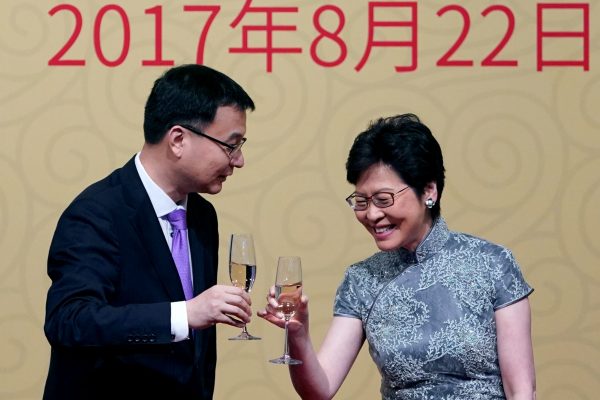He declared a struggle against all the societal forces behind the protest, ‘from the street to the law courts, to the Legislative Council, to inside the government and to universities and secondary schools’.
By August 2017 he could declare ‘mission accomplished’.
It was easiest to control the government. All it took was the anointment of the ‘trusted’ Carrie Lam as the new Chief Executive. According to Zhang Xiaoming, Director of Beijing’s Liaison Office in Hong Kong and its chief representative in the region, the Chief Executive has ‘overriding power’ over not just the executive, but also the legislative and judicial branches, seemingly placing them above the law. The chief executive’s overwhelming authority over appointments and promotions has then made it easy to manage the civil service, the police and even the Department of Justice and the courts.
To control universities, the former chief executive CY Leung stacked university councils with pro-Beijing figures. The loyal councillors would then duly appoint the ‘right’ candidates to top positions.
To control the legislature, the government first barred the independence advocate Edward Leung from running in the 2016 elections. To get rid of two other localists, Yau Wai-ching and Leung Chung-hang of Youngspiration, who managed to slip through, CY Leung asked the court to bar them from re-taking their oath to the legislature.
Before the court issued a verdict, Beijing issued an interpretation of the Basic Law that was used to retroactively disqualify any legislator-elect who made revisions or additions to the formal oath. The intervention was a sign of how much Beijing distrusted Hong Kong courts at the time. Faced with a strident and binding Beijing interpretation, the court fully complied with Beijing’s intention to expel the Youngspiration duo from the Legislative Council.
The Department of Justice sought to disqualify four more legislators: Democracy Groundwork’s Lau Siu-lai, Demosisto’s Nathan Law, the League of Social Democrats’ Leung Kwok-hung and architectural sector lawmaker Edward Yiu. With Beijing’s wishes so clearly laid out, the court issued the desired verdict with retroactive effect going back to the day of swearing-in.
And Beijing may now have also reined in the last independent branch of government — the traditionally staunchly independent Hong Kong courts. This is in light of Chen Zuoer’s comments in November 2016, in a closed meeting, complaining that Hong Kong’s Occupy Movement leaders were not being dealt with harshly enough by the local courts. Beijing’s 2014 White Paper had already admonished courts to guard national security. Throughout 2015 and 2016, pro-Beijing voices repeatedly complained that judges released the majority of protest-related defendants or gave very lenient sentences to the convicted few.
It was in this context that the Department of Justice appealed against the light sentences of community service given to 13 land rights protesters who had stormed into the legislative council building in June 2014, and three student leaders who had climbed over the fence that closed off the ‘Civic Square’ in August 2014. By August 2017, the Court of Appeal could be trusted to comply with the government’s wishes. It handed down jail terms of six months to a year for the activists. While the land rights case involves less known activists, the Civic Square case includes the well-known former student leaders Joshua Wong, Nathan Law (also one of the disqualified legislators) and Alex Chow, who were instrumental in sparking the Umbrella Movement.
The planned West Kowloon railway station will give final jurisdiction to mainland authorities. Beijing has signalled that there is no room to negotiate for better arrangements that would not violate Hong Kong’s autonomy. With the ‘one country, two systems’ model gone 30 years ahead of schedule, Hong Kong is fast becoming just another ‘mainland’ Chinese city. When the Chinese trains roll into West Kowloon under mainland jurisdiction in autumn 2018, Hong Kong will become a part of greater Shenzhen.
Beijing has broken the promises of ‘Hong Kong people ruling Hong Kong’ under ‘a high degree of autonomy’ for 50 years. The one promise that Beijing has kept is that it would not fire a shot in Hong Kong. It is a genius stroke to send in bullet trains instead of bullets.
What keeps Hong Kong distinct is what cannot be locked up: the yearning for democracy and freedoms and the commitment to fight for them among the city’s youth.
Victoria Hui is Associate Professor in Political Science at the University of Notre Dame.
A version of this article was first published here in Voice of Hong Kong.

